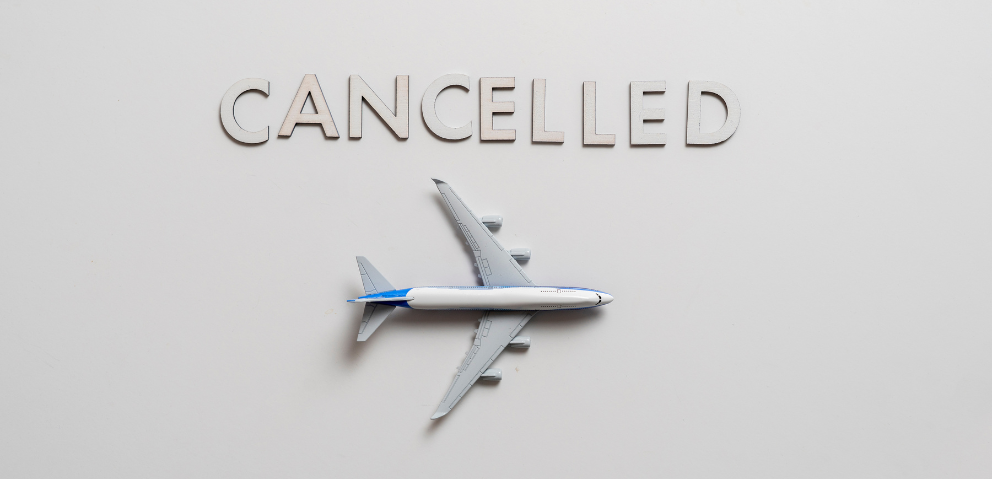Flight Delays and Cancellations: Demystifying Why Flights Get Cancelled
06 May 2024

Understanding why flights get delayed or cancelled can sometimes feel like decoding a complex puzzle. Since June 2003, airlines have been reporting the causes of these disruptions to the Bureau of Transportation Statistics, shedding light on the myriad of factors, from bad weather conditions like thunderstorms and hurricanes to technical issues and aircraft maintenance, that can ground flights. This level of transparency helps us grasp the unpredictable nature of flying, where extreme weather, airport security, and even unforeseen circumstances like earthquakes significantly impact airline delays, leading to numerous flight cancellations today and airport cancellations.
As we navigate through the complexities of flight cancellations and delays, we'll explore not just the common causes but also the profound impact these disruptions have on passengers and airlines alike. From securing compensation to understanding rebooking options, we aim to arm you with strategies to minimise the risk of cancellations.
This journey will also delve into how technological advancements and the role of a flight dispatcher are evolving to mitigate the challenges of bad weather, flight cancellations, and the ever-looming threat of extreme weather conditions, making the skies a bit friendlier for everyone. Keeping up with flight cancellation and delay news through flight tracking can offer timely insights.
Common Causes of Flight Cancellations
Understanding the multifaceted reasons behind flight cancellations helps us better prepare and possibly mitigate some of the inconveniences caused by such disruptions. Here, we delve into the primary factors that often lead to the cancellation of flights, highlighting the importance of staying informed about cancelled flights.
Weather-Related Disruptions
- Extreme Conditions: Flights can be cancelled due to severe weather conditions such as hurricanes, thunderstorms, heavy snow, and fog, which pose safety risks.
- NAS Weather Delays: Including less severe weather conditions that still impact visibility and airport operations, contributing to 33.4% of total delays in 2020, these factors are significant contributors to airport delays.
Technical and Operational Issues
- Aircraft Maintenance: Mechanical failures or necessary inspections can ground an aircraft unexpectedly.
- Air Traffic Control: Restrictions and staffing shortages can delay flights, and if unresolved timely, lead to cancellations.
- Airport Operations: Issues like runway closures, construction, or operational disruptions at the airport can also lead to cancellations.
Human Factors and Security Concerns
- Crew Shortages: Insufficient crew members, due to factors like sickness or scheduling conflicts, directly impact flight availability.
- Security Threats: Issues such as bomb threats or unauthorized drone activities near airports necessitate immediate responsive actions, often leading to cancellations.
These elements, combined with the intricate network of scheduled flights, create a complex environment where multiple factors can influence the timely departure and arrival of flights. Understanding these can aid passengers in anticipating potential delays and managing their travel plans accordingly, with tools like FlightAware and flight tracking providing essential flight data.
Impact on Passengers and Airlines
When flights are delayed or cancelled, the immediate effects on passengers and airlines are significant and multifaceted. Airlines are obligated to provide certain services to mitigate the inconvenience caused to passengers. These include rebooking on the same or a partner airline, and if the delay extends over three hours, meal vouchers are typically offered. For overnight delays, accommodations may also be provided, particularly when the issues are within the airline's control, such as crew problems or maintenance delays.
For passengers, the disruption can range from minor inconveniences to significant alterations in their travel plans. They are entitled to full flight compensation if the flight is cancelled for any reason, which provides a financial remedy but does not compensate for lost time or the potential emotional strain of disrupted travel plans. The Department of Transportation (DOT) has been active in ensuring that airlines meet their obligations for airline compensation, enhancing its oversight following a surge in cancellations and delays in recent years. This includes requiring airlines to compensate passengers and cover additional expenses incurred due to cancellations for which the airline is responsible.
Airlines, on their part, have responded to these challenges by adding new staff, opening training facilities, and adjusting flight schedules to better accommodate unforeseen disruptions. These measures are designed to reduce the frequency and impact of flight cancellations and delays, thereby improving the overall reliability of air travel. Additionally, the U.S. Department of Transportation’s Airline Customer Service Dashboard provides a transparent view of the commitments made by airlines to protect passengers, ensuring that these rights are both understood and respected, under the guidance of the aviation authority.
Navigating Compensation and Rebooking Options
Navigating the maze of compensation and rebooking options when flights are disrupted can be daunting. Here’s a practical guide to help you manage the situation effectively:
Familiarize Yourself with Airline Policies and Agreements
- Interline Ticketing Agreements: Many airlines have partnerships that allow for smoother rebooking onto another carrier if your original flight is cancelled, effectively offering a replacement flight.
- Credit Card Benefits: Always book using a credit card that offers trip disruption insurance to cover unexpected cancellations and delays. This can be a lifesaver, providing flight cancellation compensation, flight delay compensation, and compensation for delayed flights, ensuring you're covered for airline delay compensation.
- Airlines’ Compensation Policies: Understand the specific policies of the airline you're flying with, as they vary, especially regarding controllable delays and cancellations which may cover accommodations and rebooking.
Immediate Actions to Take Post-Cancellation
- Get a Room: If you’re stranded, securing accommodation should be your first step. Check if your airline provides support for this.
- Rebooking Options: Utilise the airline’s mobile app or customer service, including international hotlines if local lines are busy, to promptly rebook your flight.
- Airline Lounge: If you have access, use the lounge not just for comfort but also for efficient rebooking assistance from experienced agents.
Follow-up and Additional Rights
- Refund Entitlements: Regardless of the cancellation reason, you are entitled to a refund if your flight is significantly delayed or cancelled, ensuring you receive the cancelled flight compensation you're entitled to.
- EU Passenger Rights: If traveling in the European Union, you might be eligible for up to 600 Euros depending on the delay's circumstances, under the EU flight delay compensation, including specific provisions for flight delay compensation in the UK.
- File a Complaint: If the airline does not meet its obligations, consider filing a complaint with the U.S. Department of Transportation.
By understanding these aspects and preparing accordingly, you can alleviate some of the stress associated with flight disruptions and ensure you are adequately compensated or rebooked.
Strategies to Minimise the Risk of Cancellations
To effectively minimise the risk of flight cancellations, consider these practical strategies:
Optimal Flight Selection
- Book Nonstop Flights: Nonstop flights are less susceptible to disruptions that affect multi-leg journeys.
- Choose the First Flight of the Day: These flights are less likely to encounter delays from previous flights.
- Select Airlines Known for Punctuality: For instance, Hawaiian Airlines and Delta Air Lines have high on-time performance rates.
- Prefer Airports with High Punctuality Ratings: Airports like Charlotte Douglas International are known for efficiency and fewer delays.
Travel Preparedness
- Travel Light: Avoid checking bags to reduce time spent at baggage claims and increase flexibility in case of rebookings.
- Be Informed: Utilize tools like FlightAware to check historical on-time performance of your flights.
- Utilize Technology: Engage TSA Pre-Check for faster security checks and consider airlines' mobile apps for real-time updates.
Proactive Planning
- Avoid Peak Times: Flying early in the day can reduce the likelihood of delays caused by airport congestion.
- Skip Connections When Possible: Direct flights reduce the risk of mishaps that can occur with layovers.
- Leverage Weather Waivers: Stay ahead of forecasts and use waivers to adjust plans before major weather events impact your travel.
By integrating these strategies into your travel planning, you can enhance your chances of a smooth and timely journey.
Technological Advancements and Their Role
In the realm of aviation, technological advancements are increasingly pivotal in enhancing operational efficiency and reducing disruptions. One significant stride has been the use of sophisticated algorithms by airlines to better predict passenger demand and optimize flight schedules, a move that FlightAware's technology supports. This data-centric approach not only streamlines operations but also facilitates enhanced data-sharing among airlines, fostering a more cooperative environment in the industry.
Moreover, the integration of the Internet of Things (IoT) and smart sensors in aircraft has revolutionized maintenance strategies. These technologies enable real-time monitoring of aircraft conditions, allowing for predictive maintenance that preemptively addresses potential issues before they lead to flight delays. Such innovations are crucial in minimizing downtime and improving the reliability of flight schedules.
Artificial Intelligence (AI) and machine learning are also at the forefront of predicting and managing flight disruptions due to environmental factors. Tools like FlightAware Foresight utilise these technologies to enhance the accuracy of arrival time predictions, even in adverse conditions.
Additionally, AI-driven systems employing ultra-high definition cameras and other advanced technologies are beginning to supplement human air traffic controllers, particularly under challenging weather conditions, thus maintaining smooth operational flow. These technological enhancements not only mitigate the effects of disruptions but also pave the way for a future where air travel is more resilient and less susceptible to the whims of unpredictable elements.
Conclusion
Through the exploration of various factors leading to flight cancellations and delays, from extreme weather conditions to technical and operational issues, as well as the impact these disruptions have on passengers and airlines alike, it becomes clear that the aviation industry faces a complex set of challenges.
The detailed strategies and insights provided offer passengers a better understanding of how to navigate these inconveniences, emphasizing the importance of being prepared and making informed decisions to minimize the risks of flight disruptions. The role of technological advancements and the future of air travel indicates a promising direction towards mitigating the effects of cancellations and delays, enhancing overall operational efficiency, and ensuring a smoother travel experience for all.
The cumulative efforts taken by airlines, regulatory bodies, and technology innovators underline a concerted push towards improving reliability and passenger satisfaction in the face of the inevitable uncertainty of air travel. As we look ahead, the continuous development and integration of new technologies into the aviation industry hold the key to not only addressing current issues but also pioneering more resilient and efficient air travel. By staying informed and utilizing the strategies discussed, passengers can better equip themselves for the complexities of modern air travel, ensuring fewer disruptions and a more enjoyable journey.

